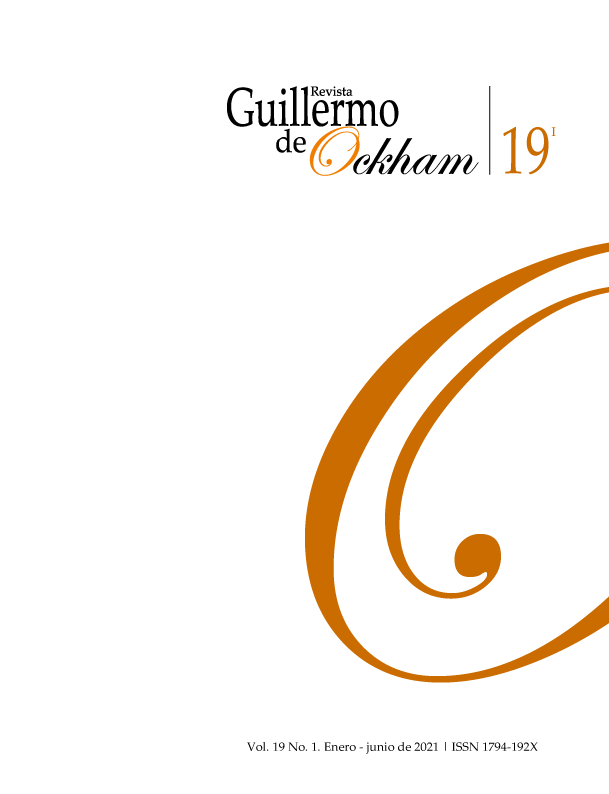La Revista Guillermo de Ockham brinda un acceso inmediato y abierto a su contenido, basado en el principio de ofrecer al público un acceso gratuito a las investigaciones para brindar un intercambio global de conocimiento. A menos que se establezca lo contrario, el contenido de esta revista tiene una licencia con Creative Commons Attribution-NonCommercial-NoDerivatives 4.0 International (CC BY-NC-ND 4.0) http://creativecommons.org/licenses/by-nc-nd/4.0/
- Atribución: debe otorgar el crédito correspondiente, proporcionar un enlace a la licencia e indicar si se realizaron cambios. Puede hacerlo de cualquier manera razonable, pero no de ninguna manera que sugiera que el licenciante lo respalda a usted o su uso.
- No comercial: no puede utilizar el material con fines comerciales.
- Sin derivados: si remezcla, transforma o construye sobre el material, no puede distribuir el material modificado.
- Sin restricciones adicionales: no puede aplicar términos legales o medidas tecnológicas que restrinjan legalmente a otros de hacer cualquier cosa que permita la licencia.
Palabras clave:
Referencias
Alzate-Pamplona, Fraidy-Alonso. (2020). Decisiones económicas en los cambios hormonales de la mujer. Cali: Editorial Bonaventuriana. https://doi.org/10.21500/EB.9789588474915
Arslan, R. C., Schilling, K. M., Gerlach, T. M., & Penke, L. (2018). Using 26,000 diary entries to show ovulatory changes in sexual desire and behavior. Journal of Personality and Social Psychology.
Beltz, A. M., & Moser, J. S. (2019). Ovarian hormones: a long overlooked but critical contributor to cognitive brain structures and function. Ann NY Acad Sci.
Davis, K. B. (1926). Periodicity of Sex Desire: Part I. Unmarried Women, College Graduates. American Journal of Obstetrics and Gynecology, 12(6), 824-838.
Galindo, O. (2020). Consumo conspicuo y conducta prosocial como rasgos costosos: una lectura evolucionista del papel de las hormonas sexuales. [Tesis de doctorado no publicada]. Universidad de los Andes, Bogotá, Colombia.
Gangestad, S. W., & Thornhill, R. (2008). Human oestrus. Proceedings of the Royal Society B: Biological Sciences, 275(1638), 991-1000.
Gangestad, S. W., Haselton, M. G., Welling, L. L., Gildersleeve, K., Pillsworth, E. G., Burriss, R. P.& Puts, D. A. (2016). How valid are assessments of conception probability in ovulatory cycle research? Evaluations, recommendations, and theoretical implications. Evolution and Human Behavior, 37(2), 85-96.
Haselton, M.G., Mortezaie, M., Pillsworth, E.G., Bleske-Rechek, A., & Frederick, D.A. (2007). Ovulatory shifts in human female ornamentation: near Hormones and Behavior 51, 40–5.
Lucas, M. M., Koff, E., & Skeath, S. (2007). Pilot study of relationship between fertility risk and bargaining. Psychological reports, 101(1), 302-310.
Roney, J. R. (2018). Functional roles of gonadal hormones in human pair bonding and sexuality.
Routledge international handbook of social neuroendocrinology, 239-255.
Sommer, B. (1992). Cognitive performance and the menstrual cycle. In Cognition and the menstrual cycle (pp. 39-66). Springer, New York, NY.
Wilcox, R. R. (2011). Introduction to robust estimation and hypothesis testing. Academic press.

 Perfil Google Scholar
Perfil Google Scholar































